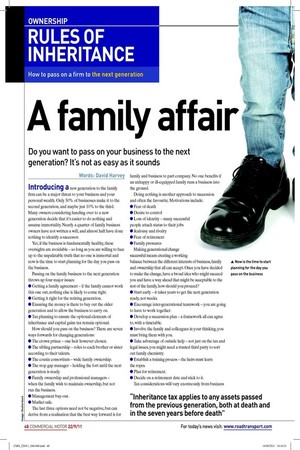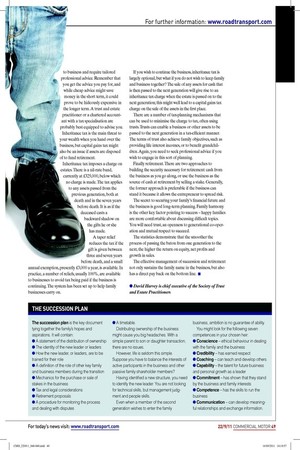A family affair
Page 32

Page 33

If you've noticed an error in this article please click here to report it so we can fix it.
Do you want to pass on your business to the next generation? It’s not as easy as it sounds
Words: David Harvey Introducing a new generation to the family irm can be a major threat to your business and your personal wealth. Only 30% of businesses make it to the second generation, and maybe just 10% to the third. Many owners considering handing over to a new generation decide that it’s easier to do nothing and assume immortality. Nearly a quarter of family business owners have not written a will, and almost half have done nothing to identify a successor.
Yet, if the business is fundamentally healthy, these oversights are avoidable – so long as you are willing to face up to the unpalatable truth that no one is immortal and now is the time to start planning for the day you pass on the business.
Passing on the family business to the next generation throws up four major issues: • Getting a family agreement – if the family cannot work this one out, nothing else is likely to come right.
• Getting it right for the retiring generation.
• Ensuring the money is there to buy out the older generation and to allow the business to carry on.
• Tax planning to ensure the optional elements of inheritance and capital gains tax remain optional. How should you pass on the business? There are seven ways forwards for changing generations: • The crown prince – one heir however chosen.
• The sibling partnership – roles to each brother or sister according to their talents.
• The cousin consortium – wide family ownership.
• The stop gap manager – holding the fort until the next generation is ready.
• Family ownership and professional managers – when the family wish to maintain ownership, but not run the business.
• Management buy-out.
• Market sale.
The last three options need not be negative, but can derive from a realisation that the best way forward is for family and business to part company. No one beneits if an unhappy or ill-equipped family runs a business into the ground.
Doing nothing is another approach to succession and often the favourite. Motivations include: • Fear of death • Desire to control • Loss of identity – many successful people attach status to their jobs • Jealousy and rivalry • Fear of retirement • Family pressures Making generational change successful means creating a working balance between the different interests of business, family and ownership that all can accept. Once you have decided to make the change, have a broad idea who might succeed you and have a way ahead that might be acceptable to the rest of the family, how should you proceed?
• Start early – it takes years to get the next generation ready, not weeks.
• Encourage inter-generational teamwork – you are going to have to work together.
• Develop a succession plan – a framework all can agree to, with a timetable.
• Involve the family and colleagues in your thinking, you must bring them with you.
• Take advantage of outside help – not just on the tax and legal issues, you might need a trusted third party to sort out family chemistry.
• Establish a training process – the heirs must learn the ropes.
• Plan for retirement.
• Decide on a retirement date and stick to it. Tax considerations will vary enormously from business to business and require tailored professional advice. Remember that you get the advice you pay for, and while cheap advice might save money in the short term, it could prove to be hideously expensive in the longer term. A trust and estate practitioner or a chartered accountant with a tax specialisation are probably best equipped to advise you. Inheritance tax is the main threat to your wealth when you hand over the business, but capital gains tax might also be an issue if assets are disposed of to fund retirement.
Inheritance tax imposes a charge on estates. There is a nil-rate band, currently at £325,000, below which no charge is made. The tax applies to any assets passed from the previous generation, both at death and in the seven years before death. It is as if the deceased casts a backward shadow on the gifts he or she has made.
A taper relief reduces the tax if the gift is given between three and seven years before death, and a small annual exemption, presently £3,000 a year, is available. In practice, a number of reliefs, usually 100%, are available to businesses to avoid tax being paid if the business is continuing. The system has been set up to help family businesses carry on. If you wish to continue the business, inheritance tax is largely optional, but what if you do not wish to keep family and business together? The sale of any assets for cash that is then passed to the next generation will give rise to an inheritance tax charge when the estate is passed on to the next generation; this might well lead to a capital gains tax charge on the sale of the assets in the irst place.
There are a number of tax-planning mechanisms that can be used to minimise the charge to tax, often using trusts. Trusts can enable a business or other assets to be passed to the next generation in a tax-eficient manner. The terms of trust also achieve family objectives, such as providing life interest incomes, or to beneit grandchildren. Again, you need to seek professional advice if you wish to engage in this sort of planning.
Finally retirement. There are two approaches to building the security necessary for retirement: cash from the business as you go along, or use the business as the source of cash at retirement by selling a stake. Generally, the former approach is preferable if the business can stand it because it allows the entrepreneur to spread risk.
The secret to securing your family’s inancial future and the business is good long-term planning. Family harmony is the other key factor pointing to success – happy families are more comfortable about discussing dificult topics. You will need trust, an openness to generational co-operation and mutual respect to succeed.
The statistics demonstrate that the smoother the process of passing the baton from one generation to the next, the higher the return on equity, net proits and growth in sales.
The effective management of succession and retirement not only sustains the family name in the business, but also has a direct pay back on the bottom line. n l David Harvey is chief executive of the Society of Trust and Estate Practitioners




































